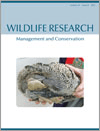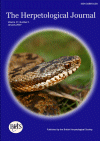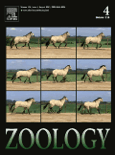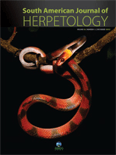
Asian Herpetological Research
Scope & Guideline
Fostering insights for wildlife conservation and ecological studies.
Introduction
Aims and Scopes
- Taxonomy and Systematics:
Research articles that provide new species descriptions and taxonomic revisions, utilizing morphological and molecular methods to clarify species relationships and diversity. - Ecology and Conservation:
Studies focusing on the ecological aspects and conservation challenges faced by amphibians and reptiles, including habitat preferences, population dynamics, and responses to environmental changes. - Physiology and Behavior:
Investigations into the physiological adaptations and behavioral traits of herpetofauna, including reproductive strategies, thermoregulation, and sensory biology. - Genetics and Evolution:
Research articles exploring genetic diversity, phylogenetics, and evolutionary processes affecting herpetological species, often utilizing next-generation sequencing and other molecular techniques. - Microbiome and Health Studies:
Research examining the gut microbiota and its effects on health, behavior, and ecology of amphibians and reptiles, contributing to our understanding of host-microbe interactions.
Trending and Emerging
- Integrative Taxonomy:
The trend of combining morphological, molecular, and ecological data to provide more comprehensive descriptions and classifications of new species is on the rise, reflecting advances in genetic techniques. - Climate Change Impact Studies:
Increasing focus on how climate change affects distribution, behavior, and reproductive cycles of herpetological species, underlining the urgency of understanding these impacts for conservation purposes. - Microbiome Research:
A growing interest in the gut microbiota of amphibians and reptiles, exploring its role in health, behavior, and ecology, which is crucial for understanding species resilience and adaptability. - Behavioral Ecology and Adaptation:
Emerging studies investigating behavioral adaptations in response to environmental pressures and human-induced changes, highlighting the dynamic interactions between species and their habitats. - Genomic and Proteomic Studies:
Research utilizing advanced genomic and proteomic techniques to unravel the complexities of herpetofaunal biology, evolution, and responses to environmental stressors is becoming increasingly prominent.
Declining or Waning
- Morphological Studies with Limited Novel Insights:
There has been a noticeable decrease in studies focused solely on morphological descriptions without accompanying molecular or ecological insights, suggesting a shift towards more integrative approaches. - Traditional Habitat Preference Studies:
Research focused primarily on static habitat preferences without considering dynamic environmental changes or anthropogenic impacts is becoming less frequent, indicating a need for more holistic ecological perspectives. - Generalized Conservation Status Reports:
Publications that provide broad overviews of conservation statuses without specific actionable insights or research-based recommendations are increasingly rare, reflecting a demand for more targeted conservation strategies.
Similar Journals

WILDLIFE RESEARCH
Elevating Standards in Wildlife Ecology and ManagementWILDLIFE RESEARCH is a leading journal dedicated to the rigorous study of wildlife ecology and management, published by CSIRO PUBLISHING in Australia. With a notable ISSN of 1035-3712 and an E-ISSN of 1448-5494, this prestigious journal has been at the forefront of advancing knowledge in the fields of ecology, evolution, behavior, and systems since its inception in 1974. Spanning over four decades, WILDLIFE RESEARCH has established itself as a Q1 journal in Ecology, Evolution, Behavior and Systematics and Q2 in Management, Monitoring, Policy and Law as of 2023, indicating its substantial impact and relevance in these critical areas. It ranks impressively in Scopus, with scores in the 72nd and 58th percentiles respectively for its categories, reflecting its commitment to high-quality research. The journal does not offer open access options, but it provides valuable insights for researchers, professionals, and students aiming to contribute to wildlife conservation and management practices. As it approaches its 50th year, WILDLIFE RESEARCH continues to play an essential role in shaping the discourse around environmental science, policy, and biodiversity conservation in the global landscape.

ARTHROPODA SELECTA
Exploring the intricate web of ecology and evolution.ARTHROPODA SELECTA is a prestigious journal dedicated to advancing the field of Ecology, Evolution, Behavior, and Systematics with a specific focus on arthropods, published by KMK Scientific Press Ltd in collaboration with Moscow State University. This journal, issued under the ISSN 0136-006X, has established its significance in the academic community by consistently providing high-quality research articles and reviews that contribute to our understanding of arthropod diversity and ecological significance. As evidenced by its classification in the Q2 quartile in both Ecology, Evolution, Behavior and Systematics and Insect Science categories as of 2023, ARTHROPODA SELECTA stands out for its rigorous peer-review process and impactful contributions to the field. Although it currently does not offer an open-access model, the journal ensures a broad dissemination of knowledge to researchers, professionals, and students alike. With a commitment to bridging gaps in existing literature and fostering interdisciplinary dialogue, ARTHROPODA SELECTA is a vital resource for anyone interested in the diverse and dynamic world of arthropods.

HERPETOLOGICAL JOURNAL
Unveiling the secrets of herpetology through rigorous research.Herpetological Journal, published by the British Herpetological Society, is a prominent platform dedicated to publishing high-quality research in the fields of herpetology, ecology, and conservation. With its ISSN 0268-0130, this journal has established a significant presence in the academic community, especially as it continues its publication journey from 1987 to 2024. Notably, the journal boasts a commendable impact factor, being ranked in the second quartile (Q2) for Animal Science and Zoology, and holds a third quartile (Q3) ranking in other essential categories including Ecological Modeling and Ecology, Evolution, Behavior and Systematics. The Herpetological Journal serves as an indispensable resource for researchers, professionals, and students, fostering the exchange of innovative ideas and insights crucial to the understanding of reptiles and amphibians. Although the journal currently does not offer open access, it remains a vital choice for those invested in the ongoing dialogue around herpetological studies and nature conservation.

ZOOLOGY
Unlocking the mysteries of the animal kingdom.ZOOLOGY, an esteemed journal published by Elsevier GmbH, stands at the forefront of research in the Animal Science and Zoology fields. With a notable impact factor and recognized as a Q1 category journal in its discipline, ZOOLOGY is highly regarded among researchers, ranking #98 out of 490 in Scopus rankings. Founded in 1994 and continuing through to 2024, the journal aims to publish cutting-edge, peer-reviewed articles that contribute significantly to the understanding of zoological sciences. Based in Munich, Germany, ZOOLOGY provides both subscription and open access options, ensuring that influential research reaches a wider audience. It serves as an essential platform for disseminating innovative findings, connecting scholars globally, and fostering interdisciplinary collaboration to advance zoological knowledge.

RAFFLES BULLETIN OF ZOOLOGY
Advancing Knowledge in Animal Science and EcologyRaffles Bulletin of Zoology, published by the National University of Singapore's Lee Kong Chian Natural History Museum, serves as a prestigious platform for the dissemination of cutting-edge research in Animal Science and Zoology, as well as Ecology, Evolution, Behavior and Systematics. With a current impact factor reflective of its Q2 category in both fields, this journal not only enhances its visibility in the academic community but also provides valuable insights into the complexities of biodiversity and conservation efforts. Covering a wide array of topics, Raffles Bulletin facilitates interdisciplinary collaboration and serves as an essential resource for researchers, professionals, and students alike. It is indexed in Scopus, ranking #233 out of 490 in Animal Science and Zoology and #406 out of 721 in Ecology, ensuring that the research published contributes significantly to the global discourse on wildlife and ecosystem management. Since its inception in 1996, this journal has bridged gaps in knowledge and continues to foster a deeper understanding of the living world.

TAIWANIA
Cultivating collaboration to address crucial ecological challenges.TAIWANIA is a prestigious and long-standing journal dedicated to the fields of ecology, evolution, and systematics, published by NATIONAL TAIWAN UNIVERSITY PRESS. Since its inception in 1947, this open-access journal has provided a vital platform for researchers to disseminate their findings, encouraging collaboration and innovation in the ecological sciences. With a 2023 impact factor placing it in Quartile 2 for Ecology and Quartile 3 for Ecology, Evolution, Behavior and Systematics, TAIWANIA is recognized for its quality and influence, ranking #267 out of 461 in Environmental Science and #426 out of 721 in Agricultural and Biological Sciences within Scopus. The journal currently publishes contributions from both local and international researchers, showcasing a diverse array of topics that address crucial ecological issues and facilitate the advancement of knowledge in the discipline. For those seeking rigorous research, engaging reviews, and a commitment to open access, TAIWANIA remains a significant resource for the global scientific community.

AMPHIBIAN & REPTILE CONSERVATION
Fostering Collaboration for a Sustainable FutureAMPHIBIAN & REPTILE CONSERVATION, published by the Amphibian Conservation Research Center & Lab, is a leading journal dedicated to the field of herpetology and environmental conservation. With an ISSN of 1083-446X and an E-ISSN of 1525-9153, this journal serves as a vital resource for researchers, conservationists, and students interested in the preservation of amphibian and reptile species. The journal has achieved remarkable rankings, categorized in the Q2 quartile for Animal Science and Zoology, Ecology, and Nature and Landscape Conservation as of 2023, reflecting its significant contribution to the scientific community. Over the converged years from 2016 to 2024, the journal has established itself as an integral platform for disseminating research findings, fostering collaboration, and enhancing the understanding of biodiversity and ecosystem dynamics. By embracing an open-access approach, AMPHIBIAN & REPTILE CONSERVATION ensures that critical research is readily available to a global audience, promoting informed conservation efforts and policy advocacy to safeguard these vital species amidst their declining populations.

Redia-Journal of Zoology
Advancing zoological knowledge, one study at a time.Redia-Journal of Zoology, published by the CRA-Research Centre Agrobiology & Pedology in Italy, is a distinguished academic journal dedicated to advancing the field of zoological studies through high-quality research and insightful reviews. With an ISSN of 0370-4327, this journal provides a platform for scholars and practitioners in the Agricultural and Biological Sciences to disseminate their findings and engage in meaningful discourse. Recognized in the 2023 Scopus rankings as Q2 in its category, Redia occupies a notable position within the global research community, ranked 138 out of 221 in Agricultural and Biological Sciences. The journal has a commitment to publishing original research from 2011 until 2024, contributing to the body of knowledge in diverse sub-disciplines of zoology, ecology, and conservation. While currently not open access, Redia strives to foster collaboration and discussion among researchers, making it a vital resource for advancing zoological sciences.

Ichthyology and Herpetology
Bridging the Gap between Science and Aquatic EcosystemsIchthyology and Herpetology is a premier academic journal dedicated to the study of fish and amphibians, providing a dynamic platform for researchers and scholars within the fields of animal science and aquatic biology. Published by the American Society of Ichthyologists and Herpetologists, this journal has rapidly established its reputation, securing a Q1 ranking in prestigious categories such as Animal Science and Zoology, Aquatic Science, and Ecology, Evolution, Behavior and Systematics as of 2023. Offering both traditional and open access options, Ichthyology and Herpetology fosters the dissemination of cutting-edge research, reviews, and methodological advancements that are essential in understanding the biodiversity and conservation of aquatic and semi-aquatic species. Furthermore, with an impressive Scopus ranking placing it in the top-tier of its fields, this journal serves as a critical resource for professionals, academics, and students alike, supporting the ongoing advancement of knowledge in these vital ecological sectors.

South American Journal of Herpetology
Fostering collaboration among herpetology enthusiasts.South American Journal of Herpetology is a vital resource in the field of herpetology, published by the Sociedade Brasileira de Herpetologia. Established to advance the study of amphibians and reptiles, this journal aims to bridge the gap between regional science and global research. As an influential platform operating from Brazil, it serves as a forum for researchers, professionals, and students dedicated to understanding the rich diversity of South American herpetofauna. With a focus on innovative studies and critical reviews, the journal has been categorized in the Q3 quartile for both Animal Science and Zoology and Ecology, Evolution, Behavior and Systematics as of 2023, indicating a growing impact within these disciplines. Although currently not open access, it offers unique insights into the ecological and evolutionary aspects of herpetology, contributing significantly to discussions on conservation and biodiversity. The journal is housed at the prestigious Museu de Zoologia da Universidade de São Paulo, ensuring high academic standards and engagement with leading researchers in the field.